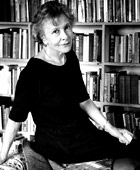Levertov began her long climb to the top in Ilford Essex, England on October twenty-fourth, 1923. She was educated at home by her mother. At age five, Levertov declared that she would be a writer. When she was twelve, Levertov sent off some of her poetry to T. S. Eliot. He sent her back some wonderful advice and encouraged her to keep writing. At age seventeen, Levertov published her first poem in Poetry Monthly. During WWII, Levertov served as a civilian nurse in London. After the war, she married Mitchell Goodman, an American writer. In two years, the happy couple would be living in the New York City area and have a son, Nickolai. In 1956, Levertov became a naturalized U.S. citizen. It was only with her book With Eyes at the back of our heads (1959) that Levertov’s British background was forgotten. Through out the sixties, Levertov was an activist and a feminist, which she expressed through her poetry. She was also the poetry editor of The Nation in 1961 as well as from 1963-65. Levertov was also poetry editor of Mother Jones from 1975-78. From 1982-93, Levertov taught creative writing at Stanford University. In 1989, Levertov moved to Seattle, WA. It was during her last decade that Levertov continued to write poetry. She passed away on December 20th, 1997 due to complications of lymphoma.
Her next book, Here and Now (1956), captures her new writing style as well as immediate praise and recognition. This book also leads Levertov to become an “important voice in the American Avant-Garde” (www.poets.org). It was in the book, Here and Now (1959), that Levertov also began to be accredited by many well known poets of that time, including: Robert Creeley, Kenneth Rexroth, and William Carlos Williams. Rexroth and Williams were both Avant-Garde poets of an earlier generation. Perhaps Levertov is best known for her poetry during the Vietnam War in the book The Sorrow Dance. This book encompassed her rage and sadness for this period. The topics this book covers are the war and the death of her older sister, Olga. It was not until 1975 that Levertov won an award for her poetry. She won the Lenore Marshall Poetry Prize for her book Freezing the Dust (1975). Her last book of poetry, This Great Unknowing: Last Poems, was published in 1999.
|






